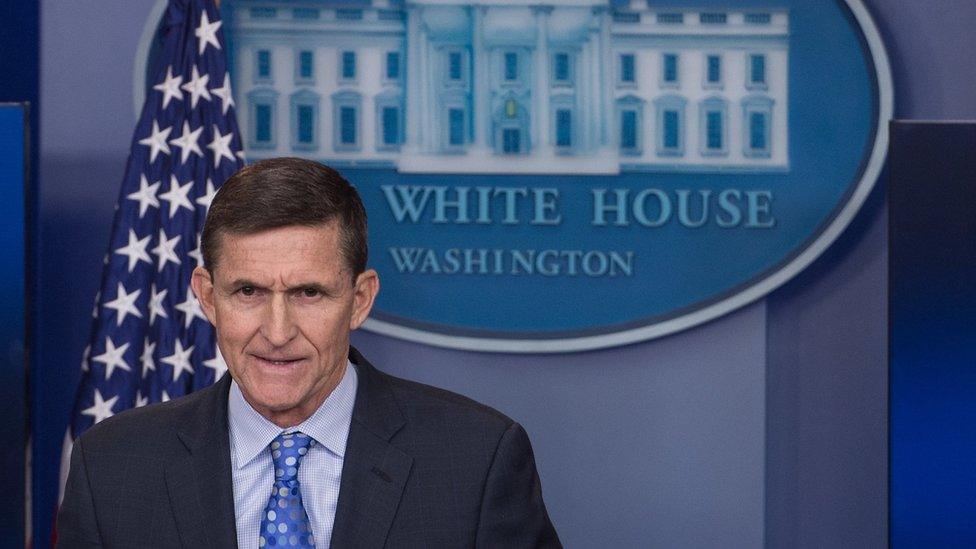Washington resignation ruffles Russia
- Published

Michael Flynn's resignation has sent Russian politicians rushing to his defence
We often refer to these as extraordinary times.
But what happened on Tuesday was both extraordinary and unprecedented. The resignation of an American national security adviser had Russian politicians reacting furiously and jumping to Michael Flynn's defence.
At the upper house of the Russian parliament, senator Alexei Pushkov tweeted that Mr Flynn was the victim of "paranoia and a witch hunt".
In a message posted online, the head of the parliament's foreign affairs committee, Konstantin Kosachev, claimed that "either Donald Trump has been driven into a corner or the new administration has been permeated with Russopohobia from top to bottom".
The language from Moscow is both colourful and angry.
That is because the Russians had high hopes for Mr Flynn. They saw him as an influential figure who championed closer ties between America and Russia.
Mr Flynn, who was pictured dining with Russian leader Vladimir Putin in 2015, is well-known in Moscow
Mr Flynn was well known to Moscow. In the past he was a semi-regular contributor to RT, Russia's state-controlled English-language TV channel.
Two years ago, Mr Flynn attended an RT gala dinner in Moscow and sat at the same table as Vladimir Putin.
But the Russians are not only disappointed. I detect a degree of embarrassment here, too.
As late as yesterday, the Kremlin was continuing to insist that, before President Trump stepped into the White House, there had been no conversations between Moscow and Washington about sanctions.
Asked by journalists today about Mr Flynn's resignation, Vladimir Putin's press secretary Dmitry Peskov said the Kremlin "wouldn't like to comment on this".
"It's the internal affair of the Trump administration. It has nothing to do with us. We have commented many times on this subject. We have nothing more to add."
I asked Mr Peskov if, after Mr Flynn's resignation, he continued to assert there had been no discussion of sanctions.
"I repeat: I have nothing more to add. We don't want to comment on this."
Mr Flynn, pictured far right, sits in on a conversation between Donald Trump and President Putin
It's not all bad news for Moscow. Far from it.
From the kind of comments he has been making in recent months, Mr Trump comes across as the most pro-Russia president in modern US history; the Russians are still counting on him to improve relations between Moscow and Washington, to ease sanctions and help bring Russia in from the cold.
Which is why the Russian state media avoids criticising President Trump; instead, it accuses his alleged "opponents" and "enemies" within the US establishment, intelligence services and American media of plotting to undermine Mr Trump's attempts to improve US-Russian ties.
And if America's 45th president fails to deliver what Moscow is waiting for?
In that case, instead of becoming a partner, America would most likely become the "enemy" again; a useful scapegoat to deflect attention from Russia's own problems at home.